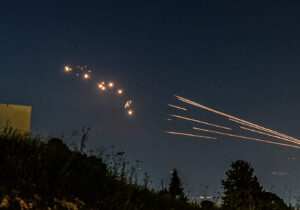–
In the early part of the 1950s, a young Israeli named Roi Rotberg left Tel Aviv to help create Kibbutz Nahal Oz, a settlement adjacent to the border with the Gaza Strip. Taking charge of defense and working the land, Rotberg was regularly involved in chasing away Arabs who crossed the furrowed border to conduct petty theft or other sometimes more serious crimes.
Sixty years ago today, on April 29, 1956, Moshe Dayan, then the Israeli army’s senior commander, learned that Rotberg had just been murdered. Dayan, hero of the 1948 War of Independence, had come to Nahal Oz the day before as the community was preparing to celebrate four weddings. He and Rotberg had met and, by all accounts, got along well.
Dayan’s own memoir describes the murder:
While the kibbutz members were putting the finishing touches to their preparations and receiving their guest, Ro’i rode away on his horse to drive off a group of Arabs who had crossed the border [and] were pasturing their flocks in the kibbutz fields and cutting their crops. When Ro’i reached them, he was shot dead, and his body was dragged across the border. His corpse, mutilated, was later handed over the U.N. soldiers, who delivered it to us for burial.
When Dayan heard about the crime, he returned to his room, where he wrote a eulogy. The eulogy is considered by many to be one of the greatest speeches of the 20th century. It is Israel’s equivalent to the Gettysburg Address. It is said to have taken Dayan half an hour to write it.
From the very inception of the Jewish State, a sense that national existence is at stake has rightly suffused the Israeli mind. More than simply a war for self-determination, the War of Independence was, for the outnumbered and ill-equipped Jewish fighters, a battle for survival. “All knew,” Dayan said, “that there could no retreat and no surrender.” Common threats breed common cause, and thus unity was found in the recognition that there were no alternatives to war. To the question of whether it was in Israel’s power to stand up to the Arab assault, the common retort was, “Is it in our power not to?” Dayan and his contemporaries understood that any prospect of survival would only be found in facing up to their enemies, rather than standing down…
Read the rest at: The Philos Project
—
Marc LiVecche is managing editor of Providence
Image credit: Moshe Dayan eulogizes Roi Rotberg, April, 1956. (IDF archives).






